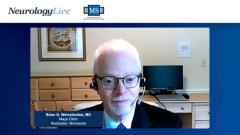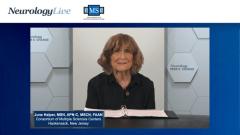
Navigating NMOSD Infusion-Based Treatment
Kim, a patient with neuromyelitis optica, describes what it has been like receiving rituximab infusions as preventive therapy, and shares advice for others who are about to embark on a similar treatment journey.
Episodes in this series

June Halper, MSN, APN-C, MSCN, FAAN: Kim, have you been started on a treatment? Share with us a little bit of how your journey has been. It’s been such a short time, actually. Doug is a veteran, and you are new at it.
Kim: Definitely. It’s a short journey but it’s been a fast journey of things happening. I’m going to go back to say perhaps the misdiagnosis I got. I’d felt something in my chest like a sharp pain as well as some other burning here. I had gone to an urgent care first, and I had also had a stomachache, similar to what Doug was talking about a stomachache. I was sent home saying, “Oh, just take some medication for constipation.” That doctor dismissed my symptoms. Within one more day, I went to urgent care, and I’m so happy that I was able to go to urgent care at the best hospital. Right away they ran tests and eventually, with my diagnosis of NMO [neuromyelitis optica], I first received the plasma exchange, which was nerve-racking. Even though it’s good for what it does, with it being COVID-19, here was my situation. You don’t have anybody in the hospital with you because of COVID-19, and the exchange has to go through your neck. I was a hero doing all of these things, but it was really tough at first to go through some of the things.
Right now I am on rituximab, which the brand name is Rituxan. My doctor discussed this with me over other things because I am aquaporin positive, and he thought that this would be a good choice. It has been five months, and I have no problems right now of recurrence or relapse. I do feel pain every day because of the neurology and spasms. As far as the relapses, none. I’m due next month in September to have another treatment. I didn’t have any problems before, so it’s just a little bit of a longer time. It does take sometimes between four and six hours.
June Halper, MSN, APN-C, MSCN, FAAN: Has COVID-19 affected you at all? Have you been vaccinated or are you planning to become vaccinated?
Kim: Right before my attack, I had the first Pfizer vaccination. But my doctors didn’t want me to take another one because there was uncertainty about if it was going to trigger something. I still haven’t taken anything else. We’re going to revisit that this week with my doctor because of everything that’s coming out. That’s where I am. I have been especially careful, double masking and everything, and watching my little circle and keeping within my circle of people and knowing that they’re vaccinated. We do what we can to stay safe.
June Halper, MSN, APN-C, MSCN, FAAN: Thank you for watching in this NeurologyLive® Cure Connections®. If you enjoyed this program, please subscribe to our e-newsletter to receive upcoming programs and other great content in your inbox.
Transcript edited for clarity.
Newsletter
Keep your finger on the pulse of neurology—subscribe to NeurologyLive for expert interviews, new data, and breakthrough treatment updates.















